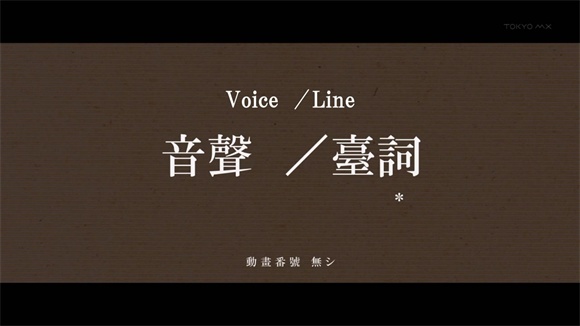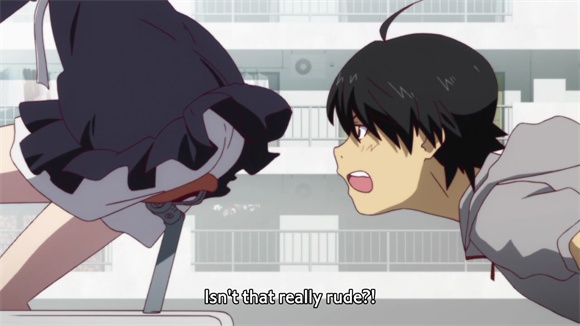12 Days 2009, #10: Wordplay
Today’s entry in the Twelve Moments of Anime project 2009:
12 Days 2009, #10: Wordplay [Bakemonogatari]
Bakemonogatari stands out as one of the most unique shows in recent memory. It has a striking visual style, part Sayonara Zetsubou Sensei, part Mirror’s Edge, and all SHAFT. Its characters are simultaneously totally bizarre, but absolutely human. It has more quick cuts than a bloodthirsty barber. While it takes itself seriously, it isn’t above poking fun at itself. And it’s fascinated with words.
I can’t remember any other show that focuses so much on its characters basically sitting around and talking to one another, sometimes about things relevant to the plot but just as often taking jabs at each other or digressing on some totally unrelated topic. SHAFT doesn’t even bother animating the conversation half the time; while the characters talk, scenes they’re discussing flash by, or random backgrounds, or scenes that are totally unrelated. Sometimes there aren’t any scenes at all—just text on a solid background.
Those text slides aren’t limited to the conversations, either. Each episode begins with a flurry of text that grows increasingly long and passes increasingly quickly, giving a short introduction to the episode. They relate Araragi’s emotions and thoughts on the events surrounding him. From time to time, scenes will be randomly interspersed with images like these, often with a single word on a slide (sometimes numbered, sometimes not). Sometimes, these words are related to the scene; these tend to echo Araragi’s thoughts. But sometimes they’re totally arbitrary and abstract, like the image above that reads only “Red”.
SHAFT has done this before; I remember pausing every few seconds to read the chalkboard gags in Sayonara Zetsubou Sensei. But unlike Zetsubou, Bakemonogatari‘s text spams are more than cheap gags; they pervade the show, so much to become its essence. Text doesn’t just show up on the blackboard as something to fill space, but it makes up everything in the series; even creatures and blood are shown as collections of words in the shape of their respective objects. Araragi’s half of a phone conversation is almost entirely presented as text and scrambled sounds in episode 6. Words are used interchangeably with characters, ideas, events, memories, objects, and actions. Even Bakemonogatari‘s characters recognize that the show centers around words; Senjougahara corrects Araragi in a phrase’s nuance in episode 3, and threatens to poke out Araragi’s eyeball after he calls Sugura “Kanbaru”.
But all this obsession with text only serves to accentuate the uniqueness of Bakemonogatari‘s visual style. Between the shiny SHAFT-animated characters and backgrounds lies an ocean of geometric figures, flat text slides, crazy animated photographs, and Araragi’s hair. It makes the show strange, but also extremely charismatic; I don’t think any other series could show a scene with two characters playing with hundreds of identical red books like they were splashing in a pool, or randomly insert Mayoi’s totally insane OP animation.
No other series could randomly have one of its characters copy the Gettysburg Address, in English, alone on the screen, and upside-down without being questioned as absolutely mental, and no other series could have a password for every episode that doesn’t seem bizarre after a while. And I’m pretty sure no other series could get away with this:
In the third episode, Araragi and Senjougahara meet at a playground, and while using the various swings, see-saws, and other playthings in the park, they talk—about sex, and fetishes, and virginity. Nothing is barred, and Senjougahara covers moe, maids, cat ears, siscon, nopan, aprons, and more. Not only is the juxtaposition of a children’s playground and sexual tension unnerving, Senjougahara is mostly teasing Araragi, and his discomfort with the situation is obvious. In a way, she does this throughout the series, from her shower service in episode 2 to her descriptions of him to her father in episode 12. But it’s these moments where Bakemonogatari really shines; they prove just how charismatic the show can be, and that’s why this is Moment #10.




Yes, the juxtaposition between the children’s playground and all the sex talk is interesting indeed. Part of what I find charismatic about this show is that it doesn’t tiptoe around being about fanservice.
This is interesting too, as being ‘about’ fanservice is distinct from being a show (merely) filled with fanservice. Not only is it self-aware about its fanservice, but it is aware at the level of it being an essay about it.
I find it a frontier of conversations about authenticity, and that makes it a very rich experience for me.